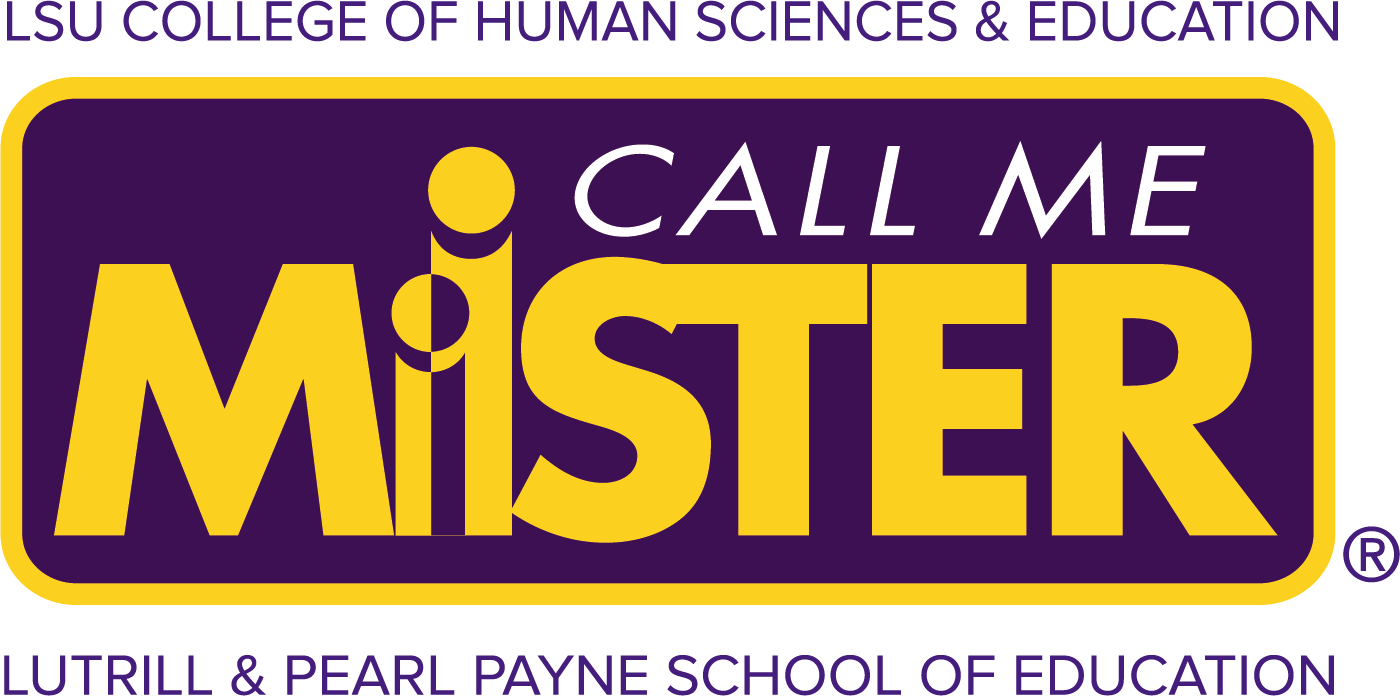Call Me MISTER® (an acronym for Mentors Instructing Students Toward Effective Role Models) is a collaboration between Clemson University and LSU. Call Me MISTER® seeks to diversify and increase the pool of Certified and Effective teachers in Louisiana from a broader background.
Call Me MISTER® Resources
The deadline for Fall 2024 is April 30, 2024.
Servant-Leadership Philosophy Guiding Core Principles:
- We advocate and promote the concept and core principles of Servant Leadership.
- We strive for full development of each teacher, drawing from educational resources within and beyond the classroom walls.
- We encourage students to engage and accept the challenges of encouraging students of all races to strive for personal excellence.
- We promote the training of skilled and caring teacher, who will stimulate, guide and challenge their students to become leaders and positive role models in their respective communities.
- We support committed, motivated students who desire to make a difference in the lives of young people.
- We support students who understand the dispositions necessary to be an effective person and teacher.
- We hold respect, responsibility, accountability, service and support as core values of the MISTER® community.
- We value contributions to society by undertaking opportunities for outreach and service to others.
- We encourage the development of strong networks of support within cohorts through participation in Call Me MISTER® Living Learning Communities.
- We encourage the development of strong networks of support across cohorts through engagement in intercampus activities (Summits, Leadership Institutes, Summer Internships, etc...).
MISTER®s will benefit from:
- Scholarship to assist with tuition and books
- An academic support system to help assure their success.
- A cohort learning model for social and cultural support
- Mentorship through Call Me MISTER® and African-American Male Initiative Programs.
- Laptop
- Tutors
- Mentors
- Continuous access to classroom environments during their programs of study through observation, service-learning, and field experiences.
- Preparation in culturally relevant pedagogy.
- Assistance with job placement.
- Official Call Me MISTER® blazer upon graduation.
Program participants must meet the following guidelines and requirements:
- be accepted at LSU
- complete the interest form using the link and full application.
- major in elementary, early childhood, or special education
- make continued satisfactory progress toward becoming accepted into the Lutrill & Pearl Payne School of Education once accepted into Call Me MISTER® and ultimately, meet all necessary requirements for graduation and certification
- MISTER®s who fail to make adequate progress in the matriculation process and/or program participation may be released from the program
- actively participate in weekly or bi-weekly seminars, as well as conferences, summits, institutes, workshops, retreats, and other activities sponsored by the program
- participate in field experiences under a mentor teacher at an elementary or middle school, service-learning activities, special programs and/or projects throughout the school year
- complete various assignments made by the CMM Program Coordinator.
- room on campus and live together as roommates with other MISTER®s where feasible in our living learning community
In order to be accepted into the Call Me MISTER® program, you must:
- Apply and be accepted at LSU.
- Complete the Free Application for Federal Student Aid (FAFSA)
- Complete the Call Me MISTER® Interest Form
- Submit the following items in the Application:
- High School diploma and final transcript or General Education Development (GED) certificate.
- Two letters of recommendation:
- One (1) from a teacher, guidance counselor, or principal at the high school from which the diploma is earned.
- One (1) from a person of the student's choice who can express the student's involvement in the community and/or potential for entering the teaching profession.
- An essay entitled, "Why I Want to Teach," which will address the student's motivation for entering the teaching profession and the contributions he hopes to make to the profession and to the community as a teacher.
- An essay entitled "How do you believe the Call Me MISTER® program will benefit you as a student?"
- A signed statement certifying that student is from an underserved, underprivileged or economically disadvantaged background or area.
Following the submission of the items above, an interview will be scheduled with the prospective program participants to ascertain their potential for teaching and their motivations for participation in the program, as well as to provide an opportunity for clarification of any information submitted through the application process.
- Center for Academic Success
- Clarence L. Barney Jr. African American Cultural Center
- College of Human Sciences & Education Office of Advocacy, Collaboration & Engagement
- College of Human Sciences & Education Office of Student Services
- Geaux Communicate
- Financial Aid & Scholarships
- LSU Cares
- LSU Libraries
- Office of the University Registrar
- Olinde Career Center
- Office of Retention & Student Success
- Residential Life
- Stay Safe at LSU
- Student Engagement & Impact
- Student Health Center
"I am a dedicated Servant Leader who is perpetuating a sorely needed concept - Servant-Leaders as role models in elementary schools. I am devoted to planting seeds of dignity and respect in children and inspiring them to cultivate those seeds, producing a crop of unprecedented success. I will teach reading, writing and arithmetic and progress to self-esteem, imagination, and determination. Because of my immeasurable promise, not only have I earned your respect, I demand it! A title is only important if ones' character and integrity dictate its use. When you address me, please verbalize my destiny... please do not call me by my first name... call me in reference to my great vision... call me MISTER!"
To best position us to achieve the goal of diversifying the available pool of educators in the state, it is imperative that we are intentional about creating a pipeline for potential MISTER®s to enter the field of education. A way to accomplish this task is by reaching out to students well before they enter their senior year of high school in hopes of igniting an interest in teaching as a profession. To that end, we established the Becoming A MISTER® (BAM) Summer Academy. This academy is a unique program that provides middle and high school students with the opportunity to explore what it means to be an educator in a changing world. During the program, students will broaden their perspective through interacting with K–12 and higher education professionals as they learn about a broad range of issues in the education profession through interactions with a Servant Leadership curriculum, resources, and practical experiences, thus cementing an interest in teaching as a profession.
Starting Summer 2025, the BAM Academy will host 15-20 middle and high school students from local school districts on our beautiful campus. Each summer for four days students will engage in enrichment experiences that will provide them with valuable information about careers in the classroom. Students will also be instructed by various educational leaders and mentors who will conduct culturally relevant learning activities. Through this program, students will learn what it means to become a teacher and transformative mentor in the classroom while being exposed to Louisiana State University and the College Experience.
Applications Available Spring 2025
Prospective teachers no longer have to pass the Praxis CORE Exam prior to being admitted into a teacher education program.
Satisfactory scores on the PRAXIS Series are required for teacher certification by the state of Louisiana. Students in teacher education curricula or concentrations must pass all required sections of the PRAXIS Series prior to graduation.
Undergraduate students should take the required PRAXIS II assessments during the last semester of course work prior to student teaching.
It is the policy of Call Me MISTER® that no person shall be excluded from participation in, be denied the benefits of, or in any way be subjected to, discrimination in any program or activity of the University. Participation in the Call Me MISTER® Program is open to anybody, regardless of race, ethnicity, or gender, if they are capable of facilitating the achievement of its objectives.
Discrimination based on age, color, disability, gender, national origin, race, religion, sexual orientation or veterans status is prohibited.

